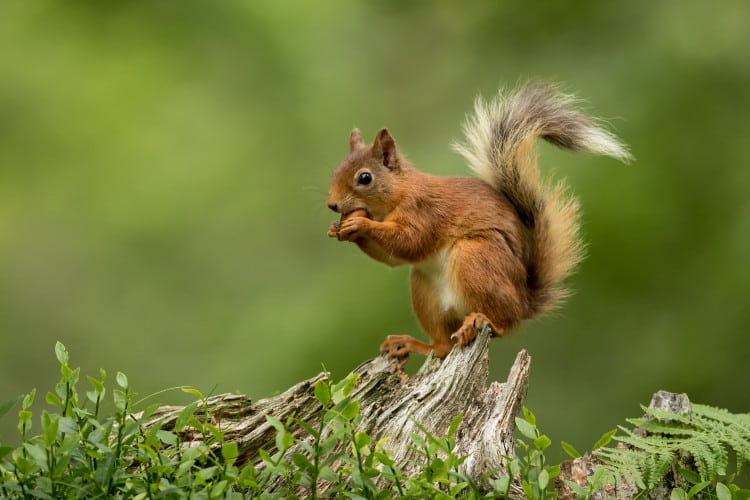This January, go nuts for squirrels! On the 21st January it’s Squirrel Appreciation Day, so let’s look at squirrels in the UK and get to know if they’re the gardener’s furry friend or foe…
UK Squirrels
Squirrels naturally plant seeds as they store them away underground. Those not collected eventually grow into trees, thus assisting with forest renewal. For this reason, we could think of them as nature’s gardeners!
At this time of year, squirrels may struggle to get by as food sources become more scarce and buried food may be inaccessible due to frozen ground. Supporting your local squirrel populations can be tricky, especially when they may cause a nuisance in the garden. Ensure food stocks don’t build up, or they can move in, but understanding their habits and habitats will go a long way to making sure you strike a balance in your green spaces.
Squirrels are quite extraordinary creates, they can leap across a space ten times the length of their body.
Red and Grey
Originally our native red squirrels were abundant across the UK, but since the introduction of grey squirrels their numbers have dwindled due to Squirrelpox virus. Although grey squirrels are an invasive species because of this, work has begun from The Wildlife Trusts to conserve their territories and preserve their numbers. Without conservation management, red squirrels could become extinct in England in about 10 years.

According to the RSPB, populations are currently estimated at approximately 140,000 red squirrels and 2.5 million grey squirrels. Red squirrels populations are present in forests in Scotland, Northern England, the Isle of Wight, islands in Poole Harbour, and even in Wales and Northern Ireland.

Incidentally, if your on the look out for grey squirrels, be aware that they are not always grey!
Some squirrels are black and in some parts of south-east England true albino squirrels are often spotted.
Grey squirrels tend to be more active during mid-morning and mid-afternoon, when they are out and about foraging.
Garden visitors
Some squirrels are known to cause damage to garden plants, stripping bark and chewing wires.
But they mainly eat seeds, buds, shoots and flowers and occasionally eat insects and birds’ eggs. To stop squirrels from eating what you don’t want them to and to encourage them to be garden helpers rather than hindrance, here are my top tips:

- Grate a little smelly soap into the hole as you plant the bulbs, and then sprinkle a bit on the surface too. The smellier the soap, the better!
- If you have a serious problem with them, you can also bury a little chicken wire just under the surface of the soil. It will block out the squirrels and the bulb will grow through it.
- Under the Wildlife and Countryside Act 1981 it’s illegal to release grey squirrels, as they are a non-native species, so don’t capture them but don’t give them a reason to want to visit either!
- To discourage them, use squirrel resistant bird feeders rather than putting food out loose.
Although squirrels have a bad time of it, with a few modifications to your planting methods and a few deterrents, our gardens can live in harmony with these nutty neighbours. So, this January, appreciate squirrels for their seed-spreading, insect-eating habits instead.

Leave A Comment